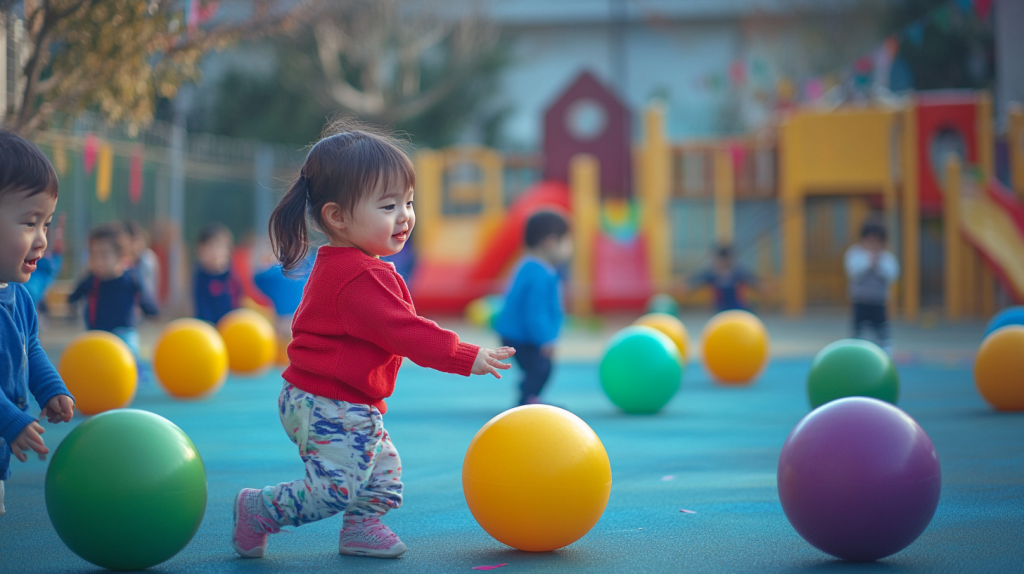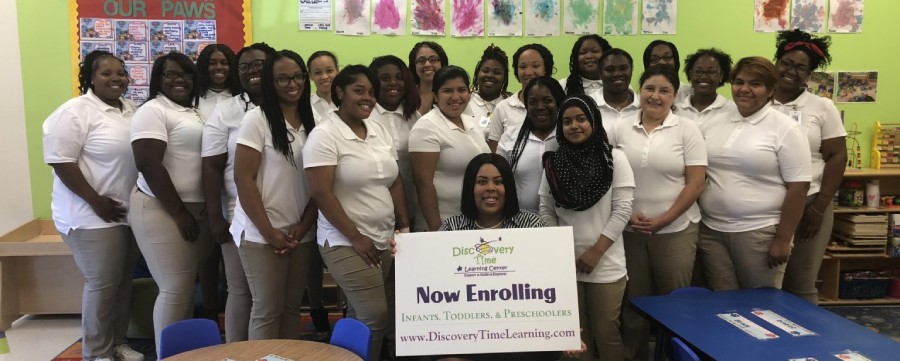As parents, we all want the absolute best for our children. We want to see them grow, thrive, and develop into confident, well-rounded individuals. Often, we imagine this growth happening in a traditional classroom setting, sitting at a desk, with books and lectures. However, what if the most powerful classroom isn’t a classroom at all? What if it’s a sandbox, a dress-up corner, or a building block tower?
Welcome to the world of play-based learning. At Discovery Time Learning Center in Alexandria, VA, we believe that play is not just a pastime; it’s a powerful tool for learning and development. This isn’t just about fun and games, it’s about intentional, purpose-driven activities that lay the groundwork for a lifetime of success. In this comprehensive guide, we’ll explore the incredible power of play and how our program is designed to harness it for your child’s benefit.
Beyond Fun and Games: The Science of Play
When a child is building a fortress out of pillows, they are doing much more than just playing. They are problem-solving, planning, and exercising their creativity. When they are engaging in a pretend tea party with a friend, they are practicing social skills, negotiating roles, and understanding different perspectives.
Scientists and child development experts have long recognized that play is a crucial part of childhood. It’s how children make sense of the world around them. It’s how they experiment with ideas, test boundaries, and develop their understanding of cause and effect. This isn’t a new concept, but in today’s fast-paced world, its importance can sometimes be overlooked.

The Four Pillars of Play-Based Learning
At Discovery Time Learning Center, our program is built on four core pillars that illustrate how play fosters holistic development. Each of these pillars works together to create a nurturing and stimulating environment where your child can flourish.
1. Cognitive Development: Building Brainpower Through Blocks and Puzzles
Many of the skills we associate with academic success, such as problem-solving, critical thinking, and mathematical reasoning, are honed through play. When a child sorts blocks by color or size, they are engaging in early math concepts like classification and seriation. When they complete a puzzle, they are developing spatial reasoning and logic.
We provide a wide array of materials that encourage this kind of thinking. From intricate LEGO sets to simple shape sorters, every toy is a tool for learning. Our educators act as guides, asking questions that encourage deeper thought, like “What do you think will happen if you put this block here?”
2. Social and Emotional Growth: Sharing, Caring, and Creating Connections
Perhaps one of the most visible benefits of play is its role in social and emotional development. Through interactions with peers, children learn to share, take turns, and resolve conflicts. They learn empathy by understanding how their actions affect others.
Our environment is a safe space for these interactions to happen naturally. In our dramatic play areas, children take on different roles, learning to see the world from another person’s perspective. In group activities, they learn to cooperate to achieve a common goal, like building a collaborative art project. These are essential life skills that can’t be taught from a textbook.
3. Physical Development: The Building Blocks of a Healthy Body
Play is inherently physical. Whether it’s running on the playground, climbing a structure, or simply playing catch, these activities build gross motor skills. Fine motor skills, which are crucial for later tasks like writing and using a keyboard, are developed through activities like drawing, cutting with scissors, and manipulating small objects.
Our center is equipped with both indoor and outdoor spaces that encourage movement and exploration. We understand that a healthy body is as important as a healthy mind. Our program integrates active play throughout the day, ensuring children have ample opportunity to move, jump, and explore their physical capabilities.
4. Language and Communication: Finding Their Voice Through Storytelling
Play is a natural stage for language development. As children engage in imaginative play, they use language to describe scenarios, negotiate roles, and tell stories. A simple game of “house” becomes an opportunity to practice dialogue, vocabulary, and narrative structure.
Our educators are always listening and engaging, providing rich language input. We read stories, sing songs, and encourage children to express themselves verbally. This creates a language-rich environment where children feel comfortable using their voice and expanding their vocabulary in a natural, organic way.
The Discovery Time Difference: Our Philosophy in Action
At Discovery Time Learning Center, we don’t just put toys in a room and call it a day. Our educators are trained to understand the developmental stages of children and to use play as a teaching tool. They are facilitators, not just instructors. They observe children’s interests and then introduce activities and materials that build on those interests, fostering deeper engagement and learning.
Our curriculum is intentionally flexible and emergent. This means it is shaped by the children themselves. If a group of children becomes fascinated with dinosaurs, our educators might introduce books about dinosaurs, create a “dinosaur dig” in the sand table, and encourage dramatic play as paleontologists. This approach makes learning relevant and exciting for every child.
What Play-Based Learning Looks Like in Practice:
- Free Play: Children choose their own activities and materials. This is where they develop independence and decision-making skills. Our role is to provide a rich, safe environment for this to happen.
- Guided Play: An educator introduces a theme or activity with a specific learning goal, but children are free to explore it in their own way. For example, building a ramp with blocks to see which car goes fastest introduces physics concepts.
- Dramatic Play: The dress-up corner becomes a hospital, a fire station, or a grocery store. Children take on roles and act out scenarios, developing social understanding and language skills.
- Sensory Play: Playing with sand, water, or play dough helps children learn about textures and properties while developing fine motor skills and creativity.

A Partnership for Your Child’s Future
Choosing the right childcare is one of the most important decisions you’ll make for your child. It’s about finding a place where they feel safe, loved, and inspired to learn. At Discovery Time Learning Center, we are more than just a daycare; we are a partner in your child’s developmental journey.
We are committed to providing a program that respects the innate curiosity of children and uses their natural inclination to play as the foundation for all learning. We know that by embracing the power of play, we are not just preparing your child for school—we are preparing them for life. We are teaching them to be confident problem-solvers, compassionate friends, and joyful learners.
Conclusion
Play is the language of childhood, and at Discovery Time Learning Center, we speak it fluently. Our play-based program offers a rich and nurturing environment for children to grow across all developmental domains. From building a tower to negotiating roles in a make-believe game, every moment is an opportunity for learning.
If you are looking for a childcare solution in Alexandria, VA, that sees your child’s potential and celebrates their journey of discovery, we invite you to learn more about our program. We offer flexible options to fit your family’s needs, including full-time, part-time, and drop-in daycare.
Ready to see the power of play in action? Contact Discovery Time Learning Center today to schedule a tour and discuss how we can partner with you to foster your child’s development. Let’s play our way to a brighter future!
FAQs about Play-Based Learning
Q1: What is play-based learning, and how is it different from a traditional preschool or daycare?
A: Play-based learning is an educational approach that uses play as the primary vehicle for learning. Unlike traditional, teacher-led models that rely heavily on structured lessons, worksheets, and direct instruction, a play-based program allows children to learn through hands-on exploration and discovery. The curriculum is often emergent, meaning it is shaped by the children’s interests. While an educator guides the activities and introduces new concepts, the child has a high degree of autonomy in their learning journey. This approach is proven to be highly effective in fostering social, emotional, cognitive, and physical development in a way that is natural and engaging for young children.
Q2: Will my child be prepared for kindergarten in a play-based program?
A: Yes, absolutely. In fact, many studies show that children who attend high-quality play-based programs are often better prepared for kindergarten than those in traditional settings. While they may not have memorized as many facts, they will have developed crucial foundational skills. These include problem-solving, critical thinking, creativity, independence, and strong social skills, all of which are essential for success in a formal school environment. Play-based learning helps children develop a love for learning itself, which is the most important trait for a lifetime of academic success.
Q3: Is “free play” at Discovery Time Learning Center just unstructured playtime?
A: No, it is not. While “free play” means children get to choose their own activities, the environment is intentionally structured to be rich with learning opportunities. Our educators carefully select and arrange materials to spark curiosity and encourage specific skills. For example, a corner with building blocks and a ruler might encourage early math skills. Our trained staff also observe children during free play, using these observations to guide future activities and to engage in conversations that promote deeper learning. It is “unstructured” in the sense that the child leads, but it is purposeful and intentional from an educational perspective.
Q4: How does play help with a child’s social and emotional development?
A: Play is a crucial “rehearsal” for social interaction. When children play with peers, they are constantly practicing and refining their social and emotional skills. They learn to share toys and materials, negotiate roles and rules, and manage disagreements. Engaging in dramatic play helps them understand different emotions and perspectives, which builds empathy. They also learn about self-regulation—how to manage their own emotions when they get frustrated or excited. This real-time, hands-on practice in a safe environment is far more effective than simply being told how to behave.
Q5: What age groups do you serve at Discovery Time Learning Center?
A: We provide care and education for a range of ages. We offer programs for infants, toddlers, and preschoolers. Our play-based philosophy is tailored to be developmentally appropriate for each age group, ensuring that every child is given the tools and opportunities they need to grow. We offer flexible scheduling options, including full-time, part-time, and drop-in daycare to accommodate the diverse needs of families in the Alexandria, VA community.



